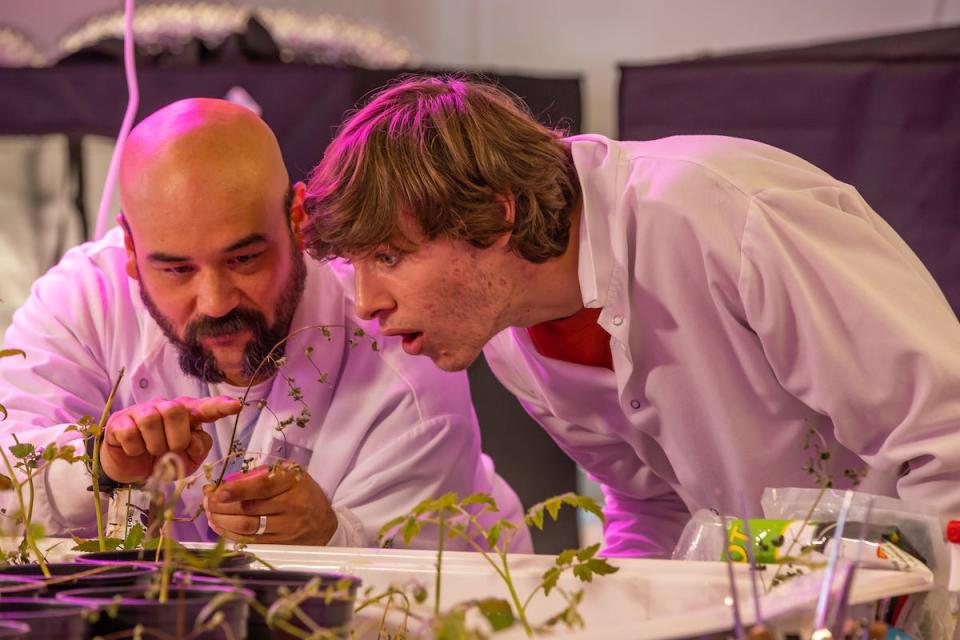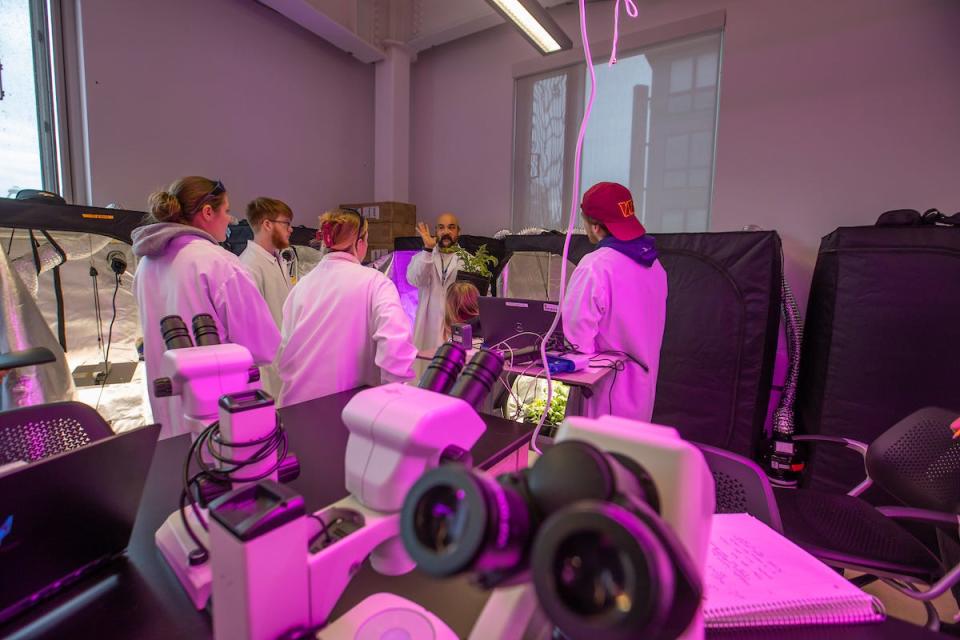Cannabis programs are growing in RI schools – but when it comes to internships there's a catch
Nick Testa, a marijuana cultivator in Exeter, placed an ad last month on a University of Rhode Island website looking to hire a student in the school’s cannabis studies program as a "grow room assistant.”
But his ad on URI's Handshake platform – used to connect students and employers for internships and job opportunities – was quickly taken down.
When Testa asked for an explanation, he was referred to a statement from URI’s legal counsel that read, in part: “The University of Rhode Island Center for Career and Experiential Education will not accept or post positions related to the use or distribution of recreational or medical marijuana.”
“As the use of marijuana is illegal at the federal level, and the university receives federal funds, we must comply with the federal law, including the Controlled Substances Act and the Drug-Free Schools and Campuses Act," the statement continued.

'The university as a whole is just being super careful ...'
In recent years, schools like URI, Johnson & Wales University and others around the region have touted new cannabis education programs to prepare students for opportunities in one of the fastest-growing industries as more and more states legalize the drug.
While the federal government is now considering loosening its stance on marijuana, many schools remain very cautious about going too far in helping students get into the cannabis field if it means risking federal funding.
“The university as a whole is just being super careful given the federal law about this,” said URI spokesman David Lavallee. “We need to follow the book, and if we feel as though placing kids in internships in dispensaries or growing sites could jeopardize our standing with the federal government and the federal grants, all that stuff, we’re not going to do that, and that’s the reason.”
URI offers two popular cannabis programs for undergraduates. Students can earn a certificate in cannabis studies through a seven-week, online-only program, or they can earn a minor degree by taking four in-person courses stretched out over 13 weeks.
Because of the federal marijuana prohibition, cannabis is banned from all college campuses, and URI’s programs don’t include lab work of any kind – even on other kinds of plants, like catnip, or tomatoes, that JWU students will grow and study in place of cannabis.
“We are very focused – because we are a pharmacy college – on the chemistry and the therapeutics of cannabis, not the horticulture, not on entrepreneurship,” said Navindra Seeram, chair of the Department of Biomedical and Pharmaceutical Sciences and head of the cannabis studies program.
At Johnson & Wales, labs are in, internships are out
Testa, a partner in the Exeter cultivation business Hank's Herbs, says JWU also refused to run his advertisement for help, citing the same concern. (Bryant University also says it won't post such job advertisements for the same reason.)
In the fall of 2021, JWU began offering a full, four-year bachelor of science degree in cannabis entrepreneurship, covering everything from growing cannabis to running a dispensary.
Magnus Thorsson, who directs the program, said he anticipated how the federal government’s stance on marijuana might change how the school would teach the intricacies of running a cannabis business.
“We took out the internship, which would have been a violation of federal law, and instead of an internship what we did was put students to work in labs.”
“They work in a laboratory environment where they have to grow plants that represent or replicate the grow characteristics of cannabis," he said. "The plants that we have relied on for the same biological behavior as cannabis include catnip, tomatoes and lettuce. So students in pairs have the responsibility to grow these plants in tents on campus, in laboratories, and there is no handling of cannabis or hemp, even.”

URI, JWU host guest speakers but play no 'active role' in career help
Like URI, Johnson & Wales also invites people like Testa who are in the field to come and lecture.
“We have guest lectures from the cannabis industry, and we develop relationships. So, if students are interested, 21 and older, they can independently pursue it. But JWU does not take an active role," Thorsson said.
One of the most popular clubs at JWU, Thorsson said, is the student-led Cannabis Advocacy Club with more than 120 members. They, too, host guest speakers at gatherings where employment connections can be cultivated independently from the school.
In Vermont, a deeper level of institutional involvement
Not all schools seem as risk-adverse as URI and JWU. A quick Google search finds schools advertising internships as part of their cannabis studies programs.
Prof. Philip Lamy teaches the cannabis program at Vermont State University in Montpelier, where according to the school’s website, “students intern in a variety of cannabis-oriented companies and organizations, including farms and cultivation sites.”
More: How are recreational pot sales in RI a year after legalization? What the numbers show.
“Yep, yep, absolutely,” said Lamy in a phone interview. “Of course, any student working with marijuana – whether it's a farm or a dispensary, working hands-on with that plant – has to be 21 and also has to be certified by the state Cannabis Control Board to be an employee in a cannabis, hands-on operation.”
Lamy said some students have gone on to become managers and assistant managers at Vermont dispensaries. The program is so popular with the state’s marijuana businesses that “we are in a situation right now where we are in more demand for our interns than we actually have interns.”
Is Vermont State University taking a risk?
“That’s a good question. I haven’t heard it posed in quite that way,” said Lamy. “No, we have not been told that students can’t work in dispensaries as their internship, as long as they’re 21. You do have me thinking about that. Maybe that’s something I have to check on.”
But, said Lamy, “We don’t hide it. We promote on our website where students have worked, so it’s never really come up as a question among the administration in our state.”
Contact Tom Mooney at: tmooney@providencejournal.com
This article originally appeared on The Providence Journal: Why RI's cannabis education college courses don't have internships

